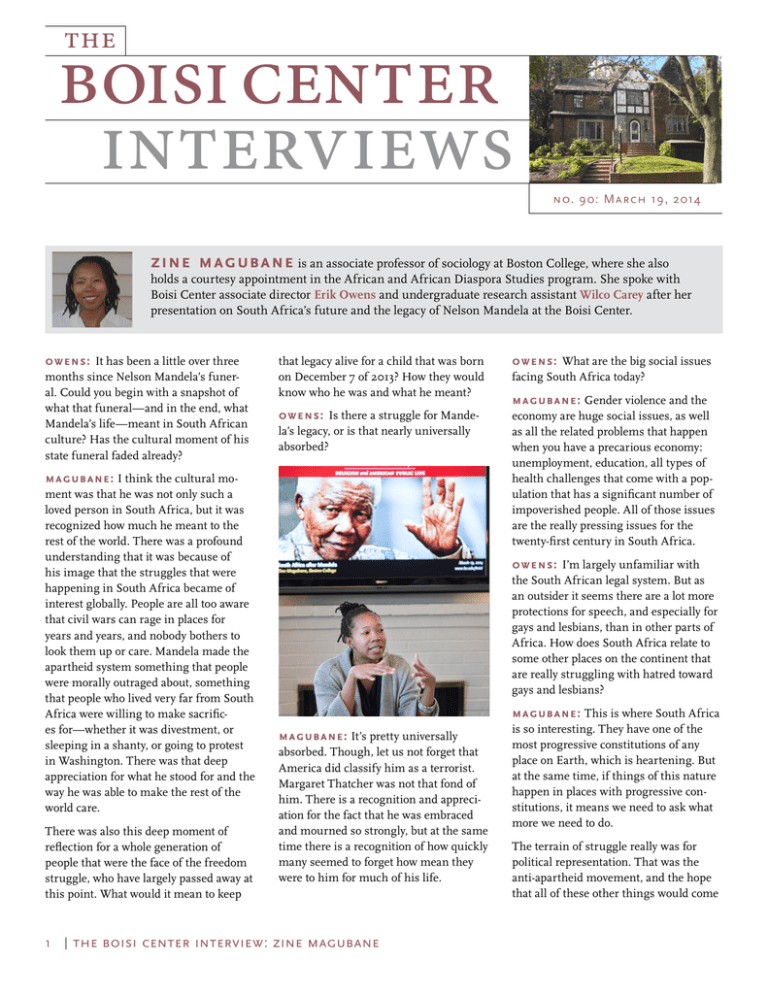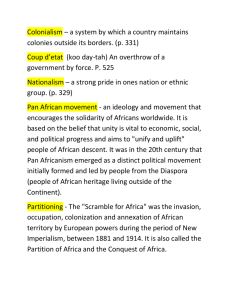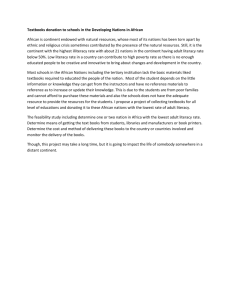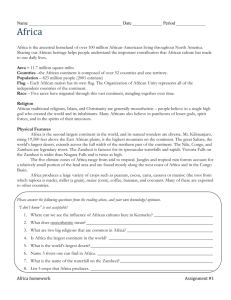Document 11102849
advertisement

the boisi center interviews no. 90: March 19, 2014 zine magubane is an associate professor of sociology at Boston College, where she also holds a courtesy appointment in the African and African Diaspora Studies program. She spoke with Boisi Center associate director Erik Owens and undergraduate research assistant Wilco Carey after her presentation on South Africa’s future and the legacy of Nelson Mandela at the Boisi Center. owens: It has been a little over three months since Nelson Mandela’s funeral. Could you begin with a snapshot of what that funeral—and in the end, what Mandela’s life—meant in South African culture? Has the cultural moment of his state funeral faded already? magubane: I think the cultural moment was that he was not only such a loved person in South Africa, but it was recognized how much he meant to the rest of the world. There was a profound understanding that it was because of his image that the struggles that were happening in South Africa became of interest globally. People are all too aware that civil wars can rage in places for years and years, and nobody bothers to look them up or care. Mandela made the apartheid system something that people were morally outraged about, something that people who lived very far from South Africa were willing to make sacrifices for—whether it was divestment, or sleeping in a shanty, or going to protest in Washington. There was that deep appreciation for what he stood for and the way he was able to make the rest of the world care. There was also this deep moment of reflection for a whole generation of people that were the face of the freedom struggle, who have largely passed away at this point. What would it mean to keep 1 that legacy alive for a child that was born on December 7 of 2013? How they would know who he was and what he meant? owens: What are the big social issues facing South Africa today? owens: Is there a struggle for Mande- economy are huge social issues, as well as all the related problems that happen when you have a precarious economy: unemployment, education, all types of health challenges that come with a population that has a significant number of impoverished people. All of those issues are the really pressing issues for the twenty-first century in South Africa. la’s legacy, or is that nearly universally absorbed? magubane: Gender violence and the owens: I’m largely unfamiliar with the South African legal system. But as an outsider it seems there are a lot more protections for speech, and especially for gays and lesbians, than in other parts of Africa. How does South Africa relate to some other places on the continent that are really struggling with hatred toward gays and lesbians? magubane: This is where South Africa magubane: It’s pretty universally absorbed. Though, let us not forget that America did classify him as a terrorist. Margaret Thatcher was not that fond of him. There is a recognition and appreciation for the fact that he was embraced and mourned so strongly, but at the same time there is a recognition of how quickly many seemed to forget how mean they were to him for much of his life. the boisi center interview: zine magubane is so interesting. They have one of the most progressive constitutions of any place on Earth, which is heartening. But at the same time, if things of this nature happen in places with progressive constitutions, it means we need to ask what more we need to do. The terrain of struggle really was for political representation. That was the anti-apartheid movement, and the hope that all of these other things would come along with it. Of course, there were concerns about poverty and education and all of those things. But the first and central issue was to get the vote to lead to those things. It is confusing and disheartening that you can have so many progressive laws on the books that don’t necessarily translate to a society that is as progressive as you would like it to be. At the same time, though, South Africa was called upon by the United Nations to be a leader on the continent. Unlike places like Uganda that are outlawing the practice of homosexuality, in South Africa it’s still fully legal, and people recognize that “corrective rape” is wrong. There are art exhibits. There are op-eds in the paper. No one is for corrective rape in a public forum. South Africa is in this position to be a thought leader at the same time that it’s struggling to get its own house in order about these issues. owens: What is the role of various religions in society? I know the country is largely Christian, but especially with regard to these core social issues of inequality, gender discrimination, sexual violence, etc., what is the role of religion? magubane: South Africa is a deeply religious society. Interestingly, being a practicing Catholic or a Protestant does not interfere at all with people practicing their traditional beliefs. In fact, being very deeply religious and also being very deeply invested in one’s traditional culture oftentimes go hand in hand. Women, for example—especially older rural women—are very into the Zion Christian Church sects. Many of those women will be married in the traditional way, and also married in a church, for example. Religiosity was a space of dissent and pushing back against the government, but on the other hand you have the Dutch Reform Church, which was one of the biggest promoters of apartheid. Religion has always played a very interesting role 2 in South Africa as both a high space of repression and a high space for speaking out against repression. What’s happening now is that religion has become one of the spaces for dialogue. Anglican Archbishop Desmond Tutu is adamant that people should not be discriminated against on the basis of their sexuality. But there are many preachers in churches who are saying that constitution or not, homosexuality is “Religion has always played a ver y interesting role in South Africa both as a high space of repression and a high space for speaking out against repression.” against the will of God, and against our traditional culture. owens: Are there pushes to change the constitution? You’ve mentioned several times clashes between traditional cultural practices and religious freedom claims or religious practices claims. magubane: No, they don’t want to change the constitution. They want to fight it out in constitutional cases that will give them a larger scope. Right now, the constitution overrides everything, and that was what this latest disagreement about the traditional courts bill the boisi center interview: zine magubane was. Were decisions to be made either by the traditional courts or according to traditional law? If a woman argued that this is in conflict with my rights as a South African citizen, which law would prevail? It was decided that the constitution would prevail. They’re essentially saying that the constitution trumps traditional law. They’re not going to try to change the constitution, but it won’t be the last time that they will try to bring a case that would change it. c arey: It’s been twenty years since the fall of apartheid, and many white South Africans have left the country to go elsewhere. Drawing from my own anecdotal experience, white South Africans I studied with at the University of Cape Town were looking at jobs overseas, particularly London. Why is this is happening? Do you see a future where these people return to South Africa? magubane: A lot of people said they were going to leave at the beginning, and a lot did. There are always still people that want to leave, but those numbers are getting smaller and smaller. First of all, there are no jobs in London, either. Second of all, people have also figured out that they can actually live a pretty segregated life, even in a racially integrated society. In many ways, blacks and whites still live separate lives. On a social level, amongst middle-class company, it’s a bit like the United States. People don’t mind having people over for dinner. There’s not much interracial marriage. People live in these segregated worlds. It has reached that level of basic liberalism, and people can very much live an entirely white life that is not touched by Africa really in any significant type of way, and at a very high standard of living. c arey: In Cape Town, where I was based, you can go to Camps Bay, which is very much like Malibu, California— people are driving Rolls Royces down the street, and you can sit and enjoy a few drinks, and everything’s great. But you can travel a few miles from Cape Town and go to a township, and you can see people pumping water and there are no bathrooms. There is incredible economic disparity. How do you reconcile that? Why isn’t there more social unrest because of that? magubane: I think it’s sort of similar to how it works here in the United States. The people in Camps Bay never go by Khayelitsha. People come into those areas to work, and then they just sort of disappear somewhere. And the South African policing system is such that they keep people from moving out of their area. People complain bitterly about crime. That’s the big cry all the time in South Africa. “There’s so much crime, there’s so much crime,” without talking about there being so much inequality. There are a lot of terrains on which this this fight over inequality is taking place, one of which is the escalating crime rate. There is also an escalation in the building of gated communities—as well as escalating efforts to get around those gated communities. I think that people just keep trying to build higher walls to get around this issue that they will have to give up a lot of what they have in order to have a peaceful, fair society, and secure society. owens: The Oscar Pistorius trial has brought a lot of these questions to the fore. Could you speak to some of the broad social issues this trial—against one of the most famous South Africans in the world today—has brought up? magubane: When you’re talking about inequality, where did Oscar live? He lived in a gated community, a largely white community, because so far none of the witnesses except for the guard at the gate has been a person of color. Here is Oscar, living in a largely white world. Oscar is a gun enthusiast. Why is Oscar such a gun enthusiast? He says he needs to protect himself and protect his assets from his fellow countrymen, his fellow citizens, these hordes of people that are ostensibly going to take things away from him. He’s 3 allowed to have these weapons, because there’s the notion that you have to protect your property, rather than share it or make a more equitable society. At the same time, South Africa has a very patriarchal society. We tend to look only at African culture, but Albie Sachs once said that the only institution in South Africa that was truly non-racial was patriarchy. Oscar was raised in an Afrikaner family, an Afrikaner context, a very, very patriarchal context and, similar to many men who abuse women, he had gotten away with it before. It was not the first time he’d shot someone, not the first girlfriend that he had treated roughly. So here you have it, this coming together of a society steeped in inequality, that makes it likely that a person will have a firearm, and a society that is deeply patriarchal, and all of those things come together in this perfect storm. It becomes plausible that you shoot someone in a bathroom instead of run away from the bathroom. owens: One last question on the topic of Mandela, but much more broadly about South African leadership on the continent: Mandela and Tutu offered a sort of moral leadership, but there are also many other kinds of leadership available to South Africa and South Africans. the boisi center interview: zine magubane What do you see as the future for South African leadership? magubane: I think that Thabo Mbeki, although his policy on AIDS was poor, has been doing a lot in South Sudan, trying to help to broker peace there. When I went to give the talk at the Leadership Institute in South Africa, Mbeki was back in Sudan again. There are strong relationships there, because many of those leaders of those nations were strongly behind the anti-apartheid struggle. These relationships have been built up over time and are based on respect and an ability to come in not as a Western outsider telling people what to do. They have the notion that “we are building our continent to go forward in the twenty-first century. We must sort out these domestic issues.” That is what his “African Solutions to African Problems” is about. There is a way in which South Africa can play an important role, despite having quite a lot of inequality and poverty, but it remains the place in Africa that everybody is trying to go to. There are people coming from Nigeria, Togo, all over the continent, because you can actually make a pretty good life for yourself in South Africa. It is relatively stable, there are not high levels of ethnic violence and conflict, and there are good universities. I think often in those forums Mbeki can talk about the fact that if you could harness that to the wealth in Nigeria, the wealth in Sudan, and the notion of we’ve got to stop fighting each other and gear our continent for its proper place, finally, after centuries of one thing after another. I do think that South Africa has a really important role—and there is that respect for its legacy, very much so. I do think they have a really important role to play on the continent, and a deep understanding, again, of a desire for Sudan to thrive. Not just because they want the oil wealth that’s there, but as an investment as being on a common continent, which is quite different than the UN or the EU telling them to sort this out. In the Congo and Sudan, they have played a pretty important role trying to deal with some of those conflicts, and they actually even did try to talk to Yoweri Museveni about this issue of this bill of making homosexuality illegal, that this is not the way that we want to go here. [end] The Boisi Center for Religion and American Public Life Boston College 2 4 Quinc y Road Chestnut Hill, MA 02 467 tel 617 - 55 2-1860 f a x 617 - 55 2-1863 publife@b c .e du Visit bc .e du/boisi-resources for a complete set of the Boisi Center Inter views and audio, video, photographs, and transcripts from our events. 4 the boisi center interview: zine magubane b oisicenter @b oisi _ center






